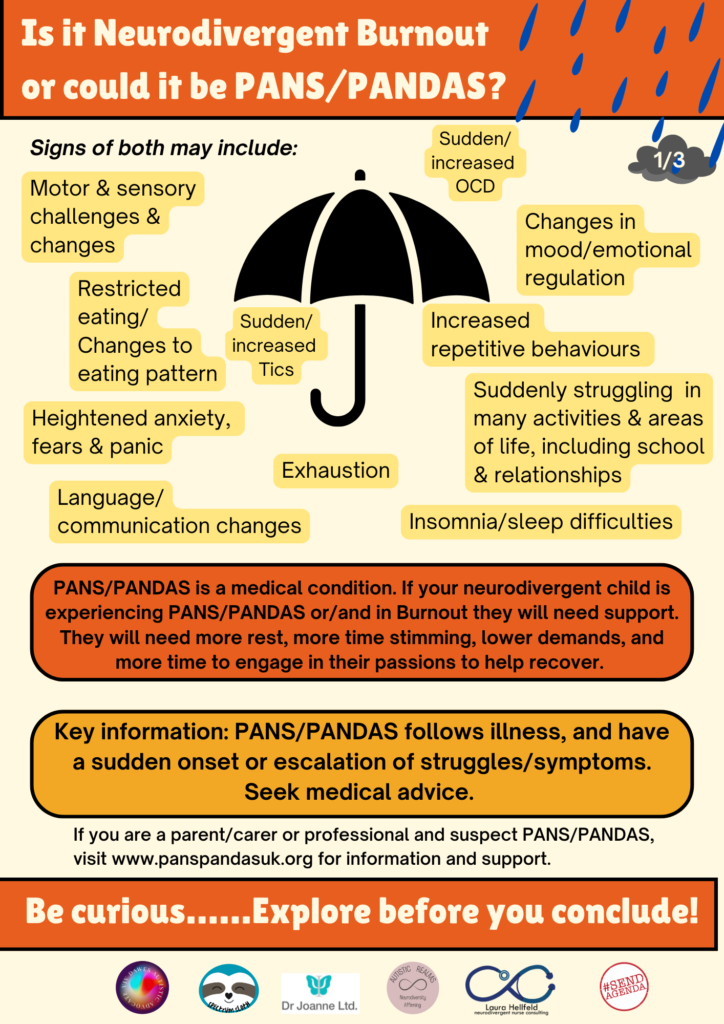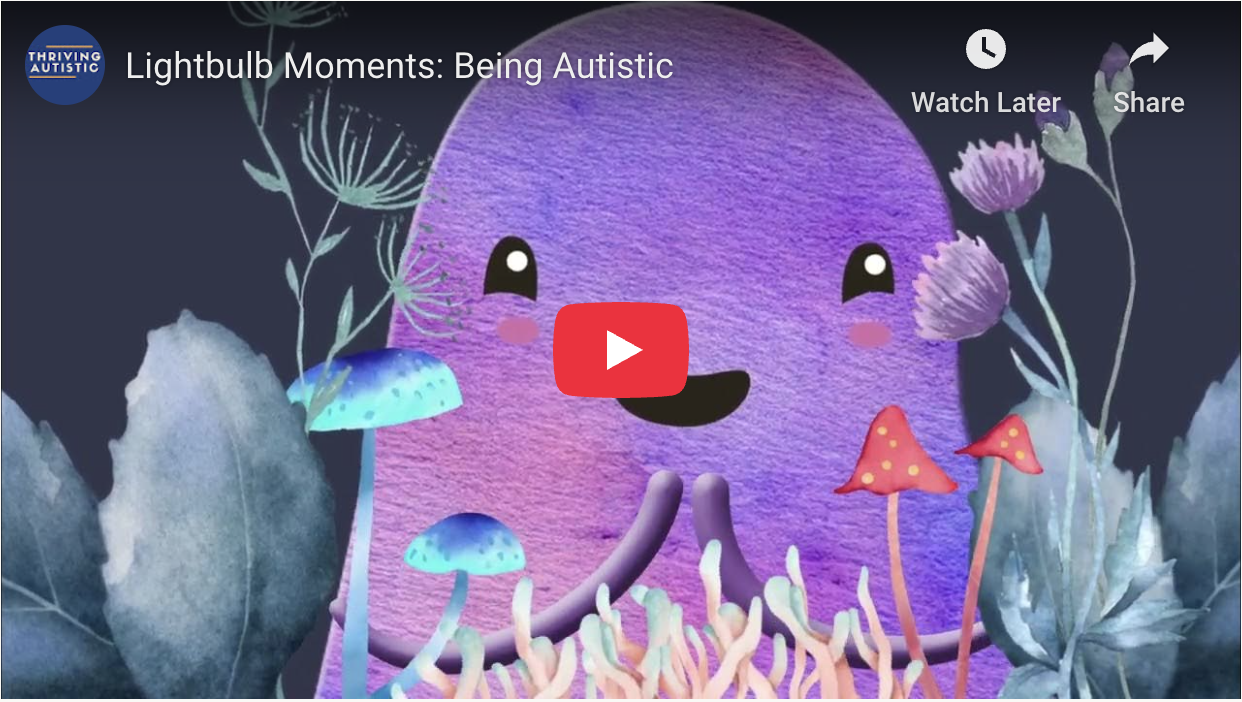Your basket is currently empty!

Could it be PANS/PANDAS… Be Curious!
This collection of text and images was created collaboratively by neurodivergent educators, working together to shine a light on this often-overlooked area of care and support.
Helen Edgar, Joanne Riordan, Laura Hellfeld, Viv Dawes, Julie Webb and Ben Palmer .
Have you noticed a change in your child’s ability to cope with life or a decline in their well-being?
It is worth being curious about what may be going on.
If your child is neurodivergent and struggling, they may be experiencing neurodivergent burnout.
However, if the change was sudden or may have been following an illness, it is also worth considering and finding out about PANS/PANDAS, especially if there has been a sudden onset or escalation of multiple unexplained changes following an illness. There are many overlaps between the presentation of PANS/PANDAS and burnout.
PANS and PANDAS are medical conditions. People with PANS or PANDAS may experience a variety of symptoms impacting mental and physical health and also the sensory system. Please seek medical advice if you think your child has PANS/PANDAS.
For more information about Autistic and Neurodivergent Burnout see my resource page. For more information about PANS/PANDAS and Neurodivergence see PANS PANDAS Charity website information page:



Signposting and Resources
The following list was collated and shared by Romy Worthington and shared by Laura Hellfeld in their Substak blog
- Romy’s PANDAS/PANS and OCD Youtube Playlist: https://www.youtube.com/playlist?list=PL39925jJXko0mAIEKiO9k9TwOdKl9tJ4M
- Romy’s Instagram page with a lot of PANDAS/PANS posts: https://www.instagram.com/chronic.advocate?utm_source=ig_web_button_share_sheet&igsh=ZDNlZDc0MzIxNw==
- Information on antibiotics for PANDAS/PANS: https://www.pandasppn.org/antibiotics/
- Royal College of Nursing PANDAS/PANS information: https://www.rcn.org.uk/news-and-events/Blogs/pans-pandas-a-mysterious-and-debilitating-paediatric-disorder-180523
- When specific foods trigger brain inflammation in children: https://www.lymedisease.org/members/lyme-times/2023-summer-news/foods-trigger-brain-inflammation/
- Patient stories of brain inflammation: https://braininflammation.org/patient-stories/
- A parent talking about the importance of antiviral treatment when antibiotics don’t work: https://www.linkedin.com/posts/emiliametzel_weeklypans-activity-7192897265559097344-fDqn?utm_source=share&utm_medium=member_desktop
- Food Sensitivities: https://theconversation.com/people-can-have-food-sensitivities-without-noticeable-symptoms-long-term-consumption-of-food-allergens-may-lead-to-behavior-and-mood-changes-192570
- Finding a doctor:
- The Children’s E-hospital, Dr Ubhi: https://drtimubhi.com
- E-Hospital Parents Guide
- ASPIRE www.aspire.care/ (lots of info on PANS/PANDAS and downloadable resources)
- PANS PANDAS UK Facebook group: https://aspire.care/treating-pans/medications/
- Information on false FII allegations: https://panspandasuk.org/support-resources/safeguarding-and-fii/
- Stanford medicine PANS PANDAS Q&A: https://med.stanford.edu/pans/about/Q-and-A.html
- A Q&A with an expert on PANS and Lyme: https://neuroimmune.org/dr-shannon-delaney-interview/
- Info on Lyme testing: https://arminlabs.com/en/diseases/bacteria/lyme-borreliosis
- PANS PANDAS UK Facebook group: https://www.facebook.com/groups/189721514954497
Please see PANS PANDAS Charity UK for further information and resources for:
Health Professionals
Educational Professionals
Families and Carers
Adults with PANS/PANDAS
Other Supportive Organisations
References
Resource Library
Latest Posts
-
Autistic Burnout – Supporting Young People At Home & School

Autistic burnout in young people is real—and recovery starts with understanding. This post offers neuroaffirming ways to spot the signs, reduce demands, and truly support. 💛 #AutisticBurnout #Neuroaffirming #Monotropism #AutisticSupport
-
Monotropic Interests and Looping Thoughts

The theory of monotropism was developed by Murray, Lawson and Lesser in their article, Attention, monotropism and the diagnostic criteria for autism (2005). Monotropism is increasingly considered to be the underlying principle behind autism and is becoming more widely recognised, especially within autistic and neurodivergent communities. Fergus Murray, in their article Me and Monotropism:…
-
Map of Monotropic Experiences

Monotropism seeks to explain Autism in terms of attention distribution and interests. OSF Preprints | Development and Validation of a Novel Self-Report Measure of Monotropism in Autistic and Non-Autistic People: The Monotropism Questionnaire This map highlights 20 common aspects of my personal monotropic experiences. How many do you experience? Where are you on the map…
-
Autistic Burnout – Supporting Young People At Home & School

Being autistic is not an illness or a disorder in itself, but being autistic can have an impact on a person’s mental and physical health. This is due to the often unmet needs of living in a world that is generally designed for the well-being of people who are not autistic. In addition, three-quarters of…
-
The Double Empathy Problem is DEEP

“The growing cracks in the thin veneer of our “civilised” economic and social operating model are impossible to ignore”, Jorn Bettin (2021). The double empathy problem (Milton, 2012) creates a gap of disconnect experienced between people due to misunderstood shared lived experiences. It is “a breakdown in reciprocity and mutual understanding that can happen between people…
-
Top 5 Neurodivergent-Informed Strategies

Top 5 Neurodivergent-Informed Strategies By Helen Edgar, Autistic Realms, June 2024. 1. Be Kind Take time to listen and be with people in meaningful ways to help bridge the Double Empathy Problem (Milton, 2012). Be embodied and listen not only to people’s words but also to their bodies and sensory systems. Be responsive to people’s…
-
Autistic Community: Connections and Becoming

Everyone seeks connection in some way or another. Connections may look different for autistic people. In line with the motto from Anna Freud’s National Autism Trainer Programme (Acceptance, Belonging and Connection), creating a sense of acceptance and belonging is likely to be more meaningful for autistic people than putting pressure on them to try and…
-
Monotropism, Autism & OCD

This blog has been inspired by Dr Jeremy Shuman’s (PsyD) presentation, ‘Neurodiversity-Affirming OCD Care‘ (August 2023), available here. Exploring similarities and differences between Autistic and OCD monotropic flow states. Can attention tunnels freeze, and thoughts get stuck? Autism research is shifting; many people are moving away from the medical deficit model and seeing the value…
-
Monotropism Questionnaire & Inner Autistic/ADHD Experiences

Post first published 28th July 2023 Over the past few weeks, there has been a sudden surge of interest in the Monotropism Questionnaire (MQ), pre-print released in June 2023 in the research paper ‘Development and Validation of a Novel Self-Report Measure of Monotropism in Autistic and Non-Autistic People: The Monotropism Questionnaire.‘ by Garau, V., Murray,…
-
Penguin Pebbling: An Autistic Love Language

Penguin Pebbling is a neurodivergent way of showing you care, like sharing a meme or twig or pretty stone to say “I’m thinking of you,” inspired by penguins who gift pebbles to those they care about.
-
Discovering Belonging: Creating Neuro-Affirming Animations with Thriving Autistic

Discovering Belonging: Neuro-Affirming Animations with Thriving Autistic. Celebrate Autistic identity through the Discovery Programme and new animations that explore belonging, strengths, and community.
-
Being Autistic shapes grief: Explore unique paths through loss and affirming support

Explore how Autistic people experience grief differently and discover affirming resources, support, and strategies for navigating loss with compassion.
-
Reflections on the Autistic Mental Health Conference 2025

Reflections On The Autistic Mental Health Conference. An Interview between David Gray-Hammond & Helen Edgar













